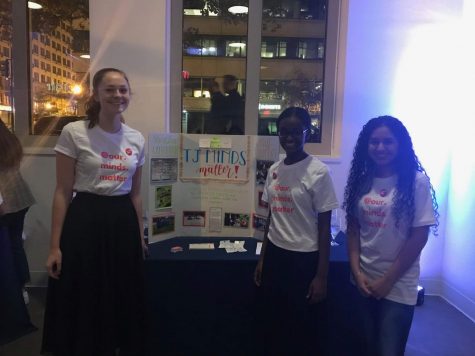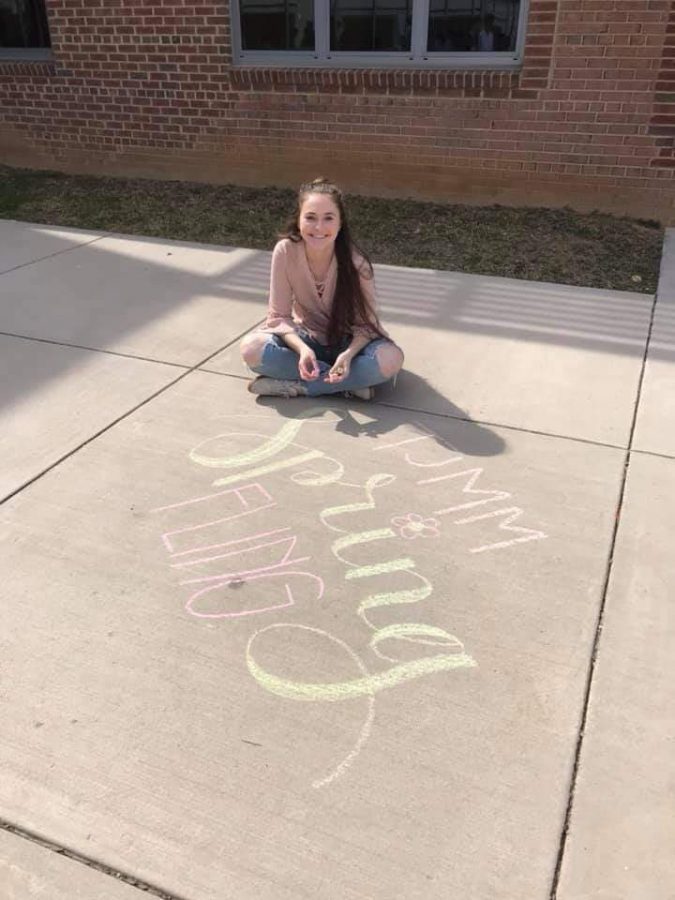Lessons I’m learning from a life-long journey
Trigger Warning: Suicide, Self-harm
November 9, 2020
Ethington, now TJ Minds Matter (TJMM) President and Mental Health Coalition Co-chair, sits at TJMM’s Spring Fling event, the first event she’d helped plan.
As a leader of Jefferson’s many mental health efforts, I’ve struggled with feelings of inadequacy for not having “figured out” my own mental health struggles. I’m supposed to be the success story, someone struggling students can look to for inspiration to seek help because one day they can solve their problems, like me. These expectations, whether real or perceived, have made me afraid to share my mental health journey publicly because it’s a journey I’m still on, a story that doesn’t end when I finish writing. The truth is that I was drawn to mental health advocacy not because I wanted to share my success with others but because I needed help, and I didn’t know how to receive it except by seeking after it myself. And for that, I often feel ashamed or unqualified to share my experiences with you because I can’t also tell you that one day everything becomes easy or disappears. But as I’ve witnessed the long-lasting impact mental health and suicide have had in my own family, as I’ve experienced the guilt and heartache of losing two classmates to suicide when my job is to prevent any student from feeling they have no other option, I’ve realized that the worst thing I can do right now is let shame or fear keep me silent. And so, I’m sharing my story in its current form to remind those of you who have struggled with mental health and mental illness that your story and vulnerability have the power to change Jefferson’s culture around mental health.
My mental health journey began when I was about twelve years old. Having lost her brother to suicide, my mom taught me from a young age that mental illness runs in our family and is treatable, but, never having experienced it myself, I hardly understood what that meant. However, upon entering middle school, I began to experience intense depression stemming from constant feelings of self-doubt and hopelessness. It got to the point where I would come home from school, head straight to my room, and start crying almost daily. There was no outstanding cause of my mental distress — I had a supportive family, kind friends, and manageable schoolwork — so I felt incredibly ashamed of my depression and sought to hide it. At that time, a close friend of mine confided in me that she had begun using self-harm and restrictive eating as coping mechanisms for her poor mental health. I was appalled; at twelve, I’d never encountered or comprehended self-inflicting pain, and I tried everything I could think of to convince her to stop. Over time, however, I discovered that a large portion of the girls I admired and spent time with were similarly harming themselves, motivated by feelings of personal doubt I understood all too well. Too embarrassed of my mental struggles to admit I needed help, I instead mimicked their habits in an attempt to find relief and express my emotions. A problem that once horrified me became normalized and acceptable by virtue of its prevalence. We all knew something was wrong but shame kept us silent.
As you can imagine, entering Jefferson, itself a pressure-cooker for mental health challenges, with self-destructive habits and too much fear to seek help only exacerbated the situation. I felt incredibly alone and inadequate in my struggles as I watched students complain they were “depressed” over a test score. By the time I reached my sophomore year, the overwhelm of hiding my worsening depression became too much, and one day I seriously considered taking my own life. A friend called the police, and when they arrived at my house, I was finally forced to expose and confront this second life I’d been hiding for three years. It was without a doubt the most heart-wrenching experience of my life to admit to my mom, tears in her eyes, that I’d been severely struggling with depression but was too afraid to tell her. That day, however, changed the course of my life entirely. With support from my parents, I was able to seek help from a therapist and eventually obtain medication when I needed it. No longer afraid to draw attention to my mental health, I joined TJ Minds Matter, Jefferson’s small but determined mental health club, and have had the opportunity to advocate for mental health awareness and support other students through experiences similar tomine by being vulnerable and honest in a way I’d never before believed I could.

At this point, I know it sounds like all my problems were swiftly and easily erased in one day, and if I stopped here, I could lead you to believe that, cleanly separating myself from the girl I described. But to ignore the permanence of mental health would be to lie by omission. Mental health, much like physical health, is a part of everyone, not just those whose health is struggling. I continue to struggle with my mental health on a daily basis, and recently I’ve lacked the motivation to even get out of bed some days. But although my mental health journey is not complete, nor will it ever be, I have learned two lessons from my experiences that have supported me immensely through my current struggles and I think are important for every Jefferson student to hear.
The first is that just because something is normal, doesn’t mean it is acceptable. The self-harm my middle school friends and I used to cope with our depression was heartbreaking and abhorrent, and this did not change because more people were involved. While you would expect an increased incidence of suffering to increase our determination to solve a problem, instead the opposite seems to be true. As we scroll through TJ Vents posts, we are met with countless cries for help from students at our own school, students we have classes with or have passed in the hallways, who are incredibly lost and afraid, and yet it is so easy to let their pleas melt together and ignore our responsibility to help them. As the Jefferson community, we have cultivated a climate where, because sacrificing mental wellness for academic success has become normal, we’ve deemed it acceptable. In four years, two students in the class of 2021 have taken their own lives, yet we continue to scroll past Jefferson Vents posts about suicidal thoughts and laugh at jokes about a class grade making someone want to kill themself. Tragedy is tragedy regardless of how commonplace we allow it to become, and we need to work together as a community to destroy the notion that just because so many students at Jefferson are severely struggling with their mental health it is somehow OK.
The second message is one I’m trying to teach by example: being vulnerable about your struggles is not just acceptable, it is essential to eradicating stigma and supporting each other. Vulnerability has never come easily to me, and I doubt it ever will, but in sharing my experiences publicly for the first time I hope to help those of you who have felt my same pains recognize you are not alone in your struggles. Some of my greatest inspiration to be more open about my flaws comes from a quote by Reyna Aburto, a mental health advocate who lost her father to suicide: “when we open up about our emotional challenges, admitting we are not perfect, we give others permission to share their struggles. Together we realize there is hope and we do not have to suffer alone.” I firmly believe that the greatest power mental struggles wield over us is in isolating struggling individuals and silencing us from seeking help or supporting one another. By recognizing our stories are not something to be ashamed of but rather tools to invite others to accept and seek guidance with their own challenges, we can create a community where self-acceptance and help-seeking are viable paths for all struggling students.

My invitation to the Jefferson community is to share your experiences, your rough edges, and your pains with one another. Each of us feels pressure to be “the best of the best,” to hide our emotional turmoil behind straight As, and it is so easy to feel inadequate and disappointed when comparing our worst moments with the curated images everyone else chooses to share. While we can and will continue to make positive change at the administrative level, we are the only ones able to change the student culture surrounding mental health at Jefferson. By sharing our vulnerabilities and normalizing the need for help, we can create a community where no student will ever view suicide as their only option.
If you or a loved one needs emotional support, please utilize the mental health resources below and reach out to trusted adults such as parents, teachers, or counselors.
- Text NEEDHELP to 85511 for the Crisis Link Hotline or call 703-527-4077
- Chat online with a specialist at CrisisChat.org or ImAlive.org
- Call an emergency mental health center: 703-573-5679 (Merrifield Center), 703-536-2000 (Dominion Hospital), 703-289-7560 (INOVA emergency services)
- National Suicide Prevention Lifeline: 1-800-273-8255
